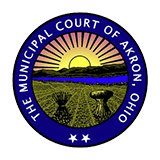AKRON MUNICIPAL COURT ADA TITLE II ACCOMMODATION REQUEST FORM
FOR COURT PROCEEDING OR OTHER COURT SERVICE / PROGRAM / ACTIVITY (NOVEMBER 2014)
RIGHT TO AN ACCOMMODATION
If you are an individual with a disability who needs an accommodation in order to participate in a court proceeding or other court service, program or activity, you are entitled, at no cost to you, to the provision of certain assistance. Requests for accommodations may be presented on this form, in another format, or orally. Please complete the attached form and return it to the Office of the Court Administrator – Akron Municipal Court, 172 South Broadway Street #300 Akron, OH 44308, Tele. 330.375.2120, Fax 330.375.2303 as far in advance as possible, but preferably at least seven days before your scheduled court appearance or other court activity. If you need assistance in completing this form due to your disability, please contact the Office of Court Administration.
ADA ACCOMMODATIONS PROVIDED BY AKRON MUNICIPAL COURT
Pursuant to Title II of the Americans with Disabilities Act, the Akron Municipal Court will make reasonable modifications to policies, practices, and procedures; furnish auxiliary aids and services; and afford program accessibility through the provision of accessible facilities, as appropriate and necessary;
Examples of auxiliary aids for services that the Akron Municipal Court may provide for qualified individuals with disabilities include:
- Assistive listening devices
- Qualified ASL certified by the Ohio Supreme Court or other types of interpreters
- Communication access real-time translation / Real-time transcription services
- Accessible formats such as large print, Braille, electronic document, or audio tapes
- Qualified readers
Accommodations that are granted by the Akron Municipal Court are made at no cost to qualified individuals with disabilities.
ASSISTANCE/SERVICES COURTS CANNOT ADMINISTRATIVELY GRANT AS ADA ACCOMMODATIONS
Examples of assistance or services the Akron Municipal Court cannot provide as an accommodation under Title II of the American with Disabilities Act include:
- Transportation to and from the courthouse
- Legal counsel or advice
- An unofficial transcript of a court proceeding
- Personal devices such as wheelchairs, hearing aids, or prescription eyeglasses
- Personal services such as medical or attendant care
- Readers for personal use or study
Additionally, the court cannot administratively grant, as an ADA accommodation, requests that impact court procedures within a specific case. Requests for extension of time, a change of venue or participation in court proceedings by telephone or videoconferencing must be submitted by written motion to the judge as part of the case. The judge may consider an individual’s disability, along with other relevant factors, in granting or denying the motion.
Furthermore, the court cannot exceed the law in granting a request for an accommodation. For example, the court cannot extend the statute of limitations for filing an action because someone claims that he or she could not make it to the court on time due to a disability, nor can the court modify the terms of agreements among parties as an ADA accommodation.
Finally, the American Disabilities Act (ADA) does not require the court system to take any action that would fundamentally alter the nature of court programs, services, or activities, or that would impose an undue financial or administrative burden on the courts.
DOCUMENTATION OF THE NEED FOR AUXILIARY AND SERVICES
If an individual has a disability that is not obvious, or when it is not readily apparent how a request for accommodation relates to an individual’s impairment, it may be necessary for the court to require the individual to provide documentation from a qualified health care provider in order for the court to fully and fairly evaluate the accommodation request. These information requests will be limited to documentation that (a) establishes the existence of a disability; (b) identifies the individual’s functional limitations; and (c) describes how the requested accommodation addresses the limitations. Any cost to obtain such documentation is the obligation of the person requesting the accommodation.
